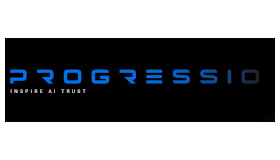Case study: Progressio AI
State of Open: The UK in 2023
Phase Two “Show us the Money”
Part 2: AI Openness

 Margaret Hartnett, Co-Founder
Margaret Hartnett, Co-Founder
Margaret, a deep tech expert with a background in AI, co-founded Progressio AI to address AI related regulatory complexities. She emphasises the vital role of Open Source in the software industry. Recognising the obligations of the European AI Act, Progression develops tools to automate compliance and emphasises the continuous nature of AI governance throughout an AI system’s lifecycle. The challenge lies in determining Open Source use in AI models, but Margaret underscores the importance of respecting licenses and recognising contributor’s creativity.
Margaret is an expert in deep tech with a PhD in the application of AI in analytical chemistry. She wears many hats, including an award-winning technologist, patent attorney and business leader who bridges the gap between commercial, legal and technology domains.
After spending over a decade in academia, she decided to leap head-first into the .com boom and became a patent attorney and IP specialist in the software industry.
During this time, Margaret maintained a very close working relationship with AI, as many of the people she represented were AI providers. Her close contact with the AI tech scene prompted Margaret to leave private practice and join an AI tech scale-up in London where she started off as their patent counsel and quickly became their director of legal and operations.
Spotting a gap in the market, Margaret combined her legal and technical knowledge to co-found Progressio AI, eight months ago. Progressio AI is now on its way to become a leading AI Governance technology provider, that offers tailored solutions to enable businesses to navi gate the complexities of AI-related regulation and legislation.
Innovation, patents and Open Source
In Margaret’s professional experience of the software industry, “if somebody tells you that they’re not using Open Source, they’re either lying, deluded, or they just don’t know”. According to her, in reality, everyone in the industry uses Open Source Software, either in their products or as supporting tools at various stages during the development of their products – resulting in innovative outputs and results. She believes that freedom of choice remains with the creator, “if they want to make their software available as Open Source, wonderful, if they want to patent it, similarly wonderful. But you can’t talk about developing software without talking about Open Source. Open Source is just as important to any aspect of the discussion of intellectual property as copyright, trademarks or patents.”
Ticking all the boxesL the adoption of AI
Recognising the obligations that the European AI Act puts on AI providers, Margaret and her co-founders established Progressio AI to fill the potential need it will create, saying, “the AI Act essentially requires AI providers and AI deployers to document every stage in the lifecycle of an AI system. And, from my experience, both as an AI researcher and as a person who has worked with and in the AI industry for decades, I strongly believe that most AI companies are unprepared for compliance with the AI Act .”
The emergence of ChatGPT is a quantum leap forward in the evolution of AI. However, the slower pace of legislation and regulation creation is leading to a disconnect between the adoption of AI technologies and their governance. The AI Act “imposes very significant obligations on providers along the value chain of large language models (LLMs)” bringing into question the ownership of their outputs. A critical area, for example, is attribution of software created by AI trained on Open Source works. The norm is for Open Source licences to require attribution. She explains, “to my mind, it doesn’t matter whether it’s an LLM or a human being, if they are using an Open Source work, the contribution that the author of the work has very kindly made should be respected. They didn’t have to make their work available as Open Source. Authors should be recognised for the time, effort and creativity they put into their works. Following the requirements in Open Source licences, recognises people’s creativity.”
But how do you determine the extent of its use? Can you really say that you can ascribe Open Source licence terms from works that might be 200 lines of code, when the LLM might only be using one part of one line of code from the work. That is really difficult.
As she says, “It’s a challenging one, because so many of the really great models that we’re seeing today are coming from the Open Source community. These evolutions in AI wouldn’t exist without Open Source, and certainly not without the open economy, open data, open publications, etc. The distinction though, between a model and its application in business is immense.
That’s one of the issues we deal with in Progressio AI “ our aim is to support organisations answering such questions, thereby ensuring that AI is developed, deployed and leveraged in a responsible and ethical way”.
Progressio AI is developing tools to automate various aspects of compliance with the AI act, to make it easier for AI companies to comply. Because, as she says, “AI governance is not a one-off activity. It’s not like you just get an audit done and that’s it. On the contrary, AI governance is a process that continues during the entire lifecycle of an AI system.”
